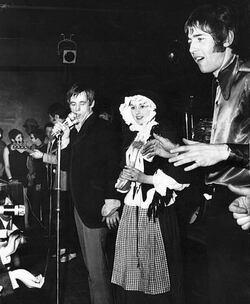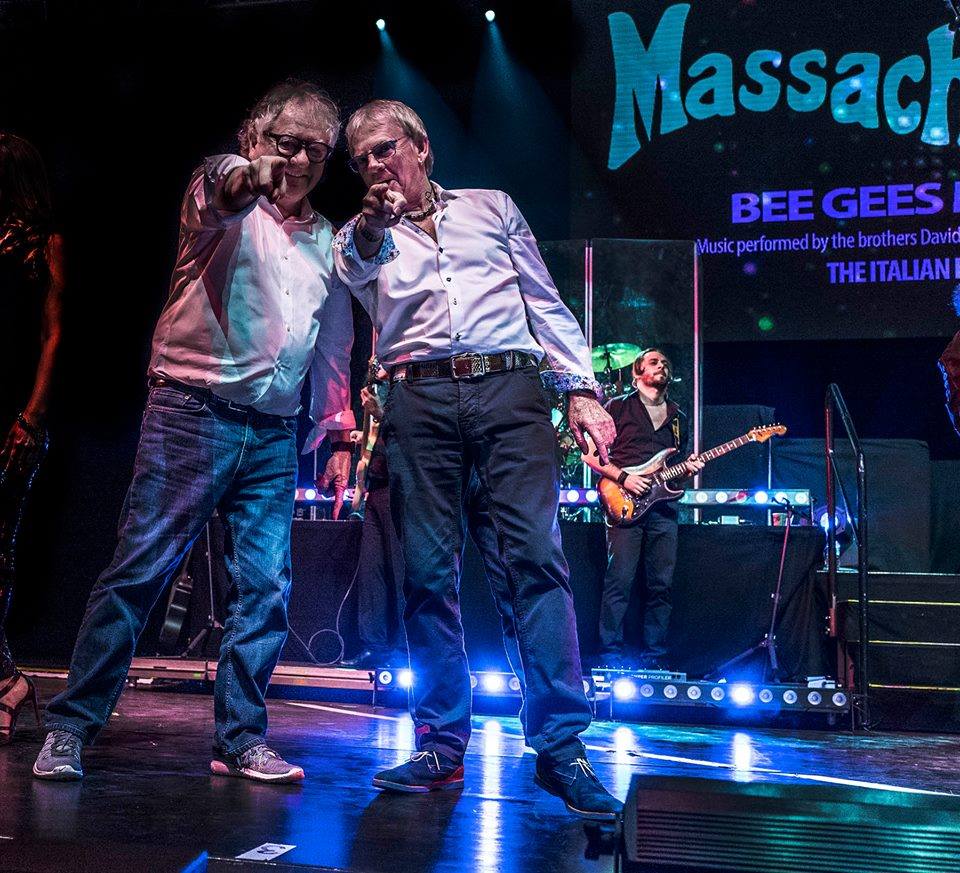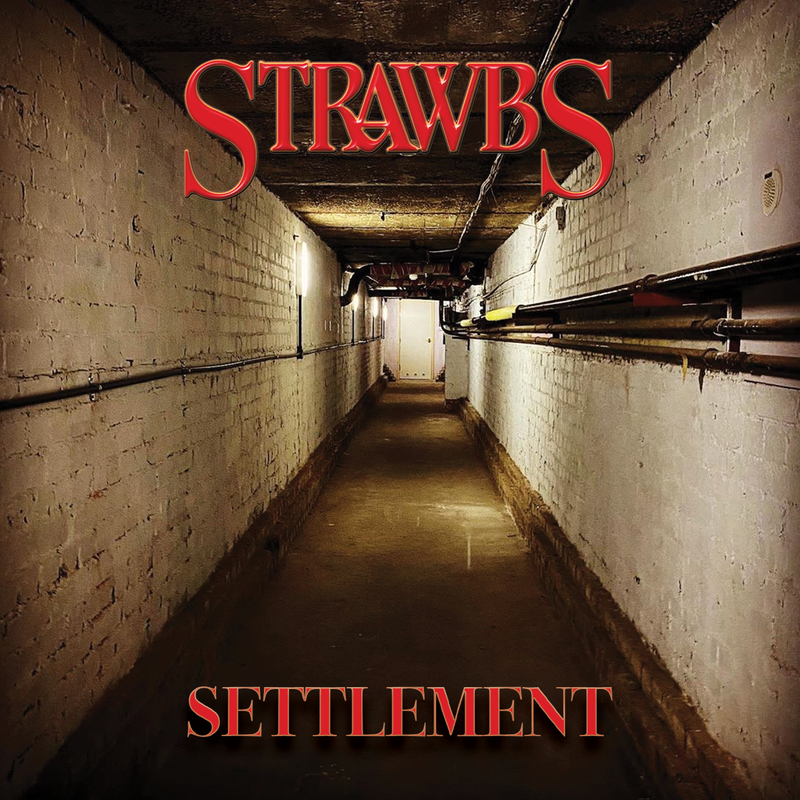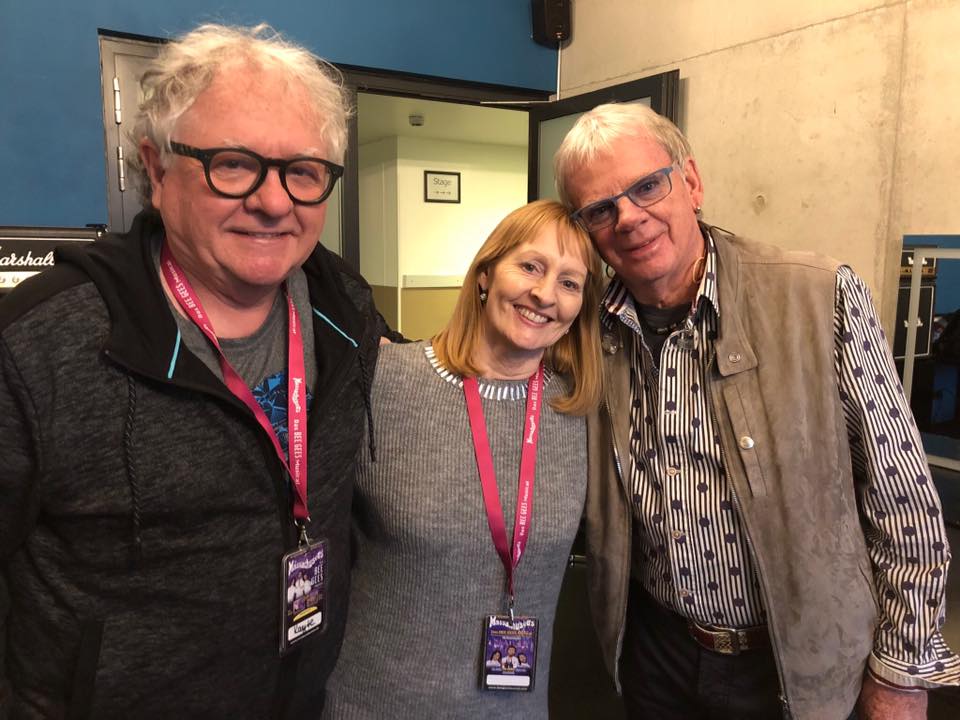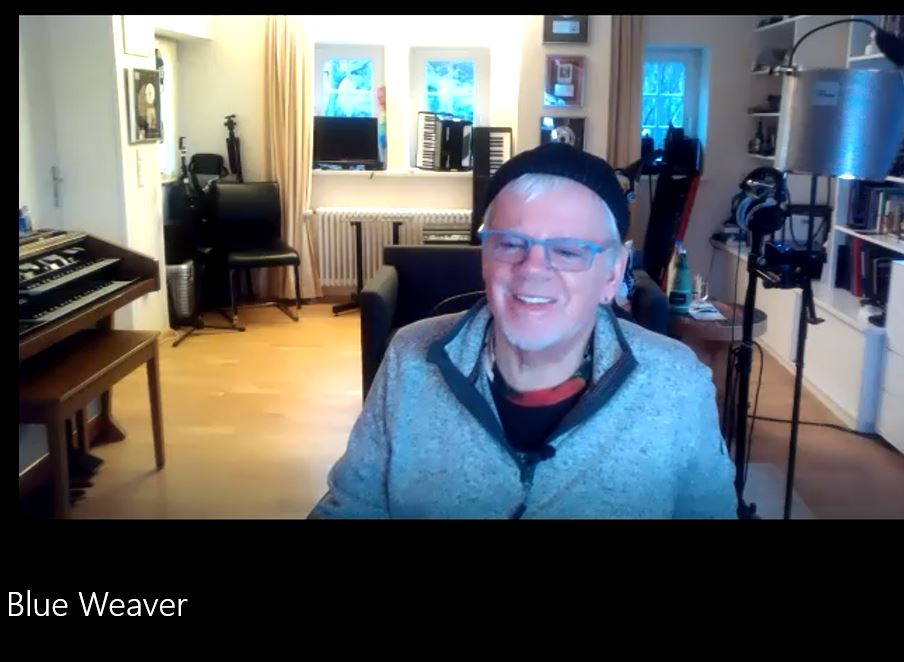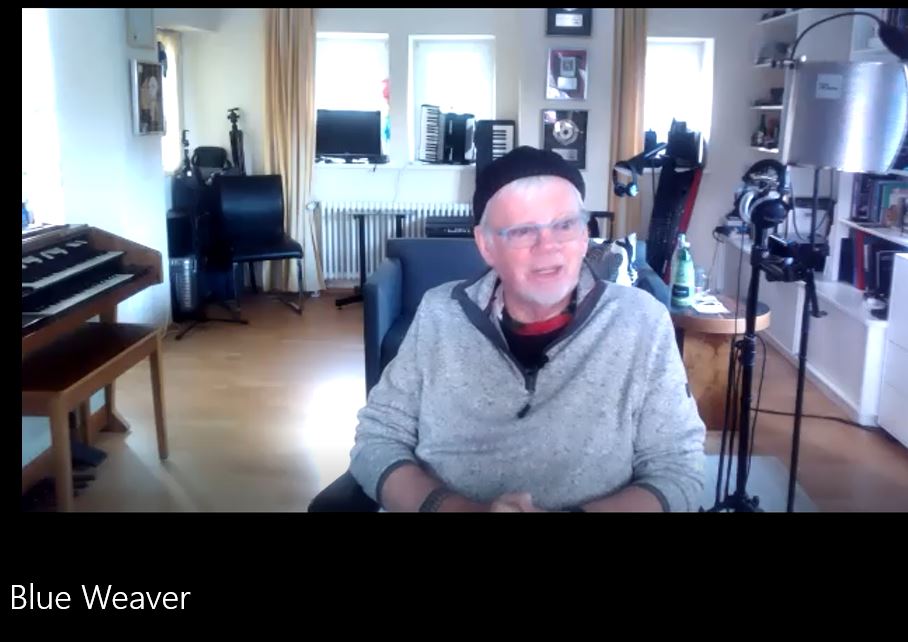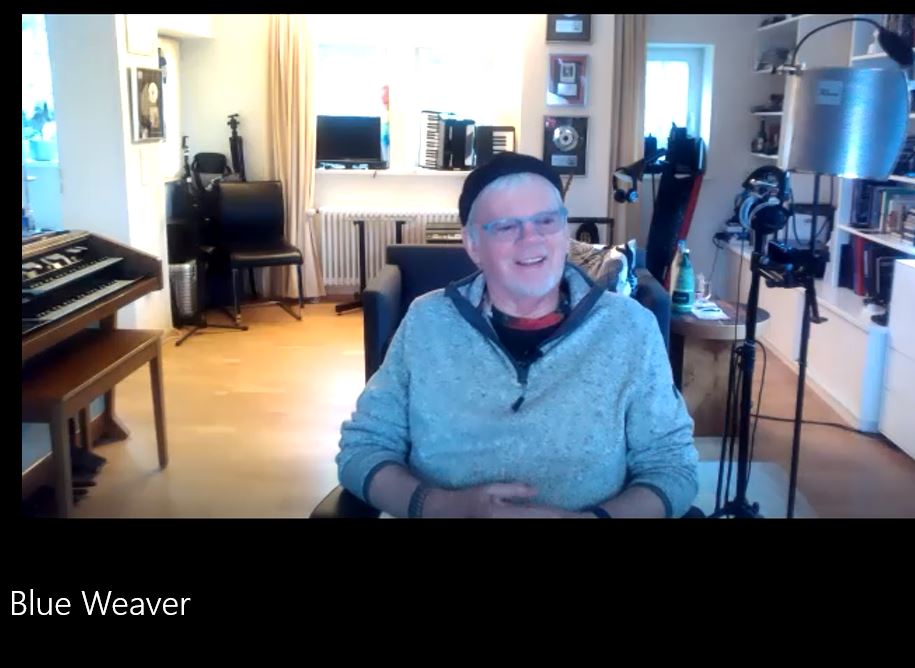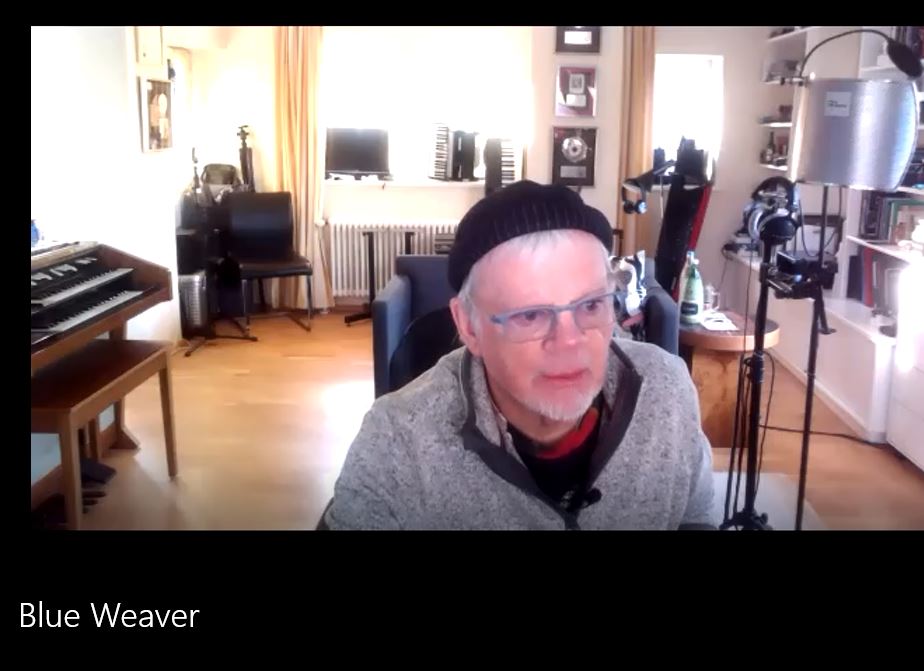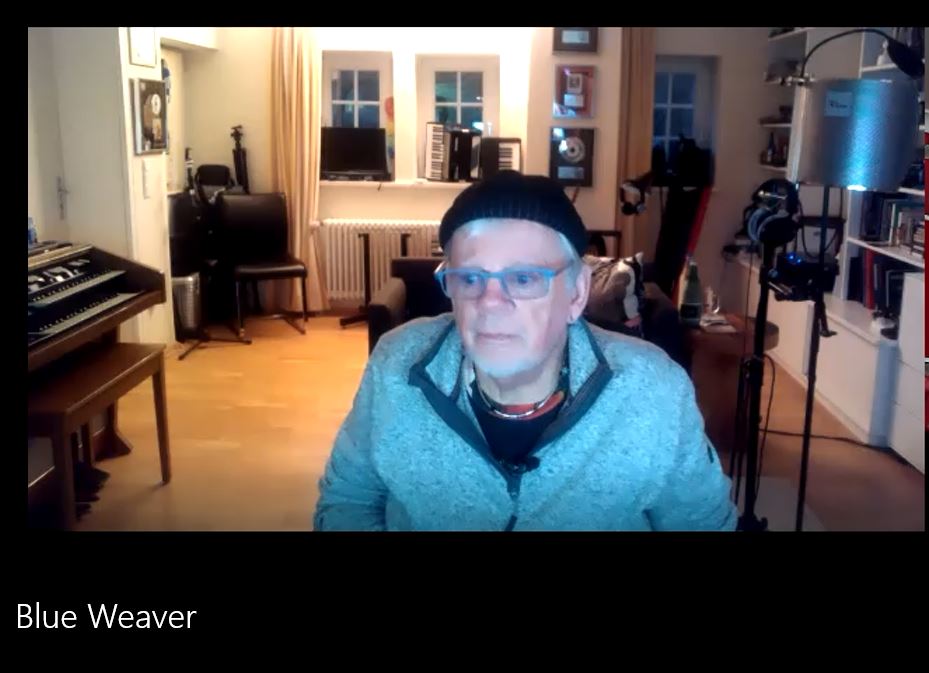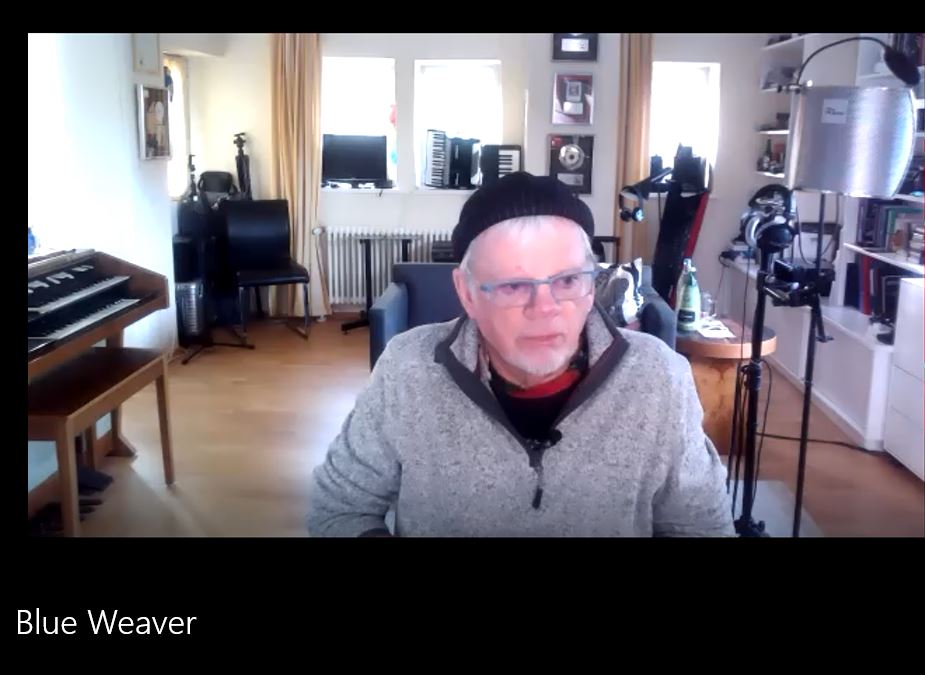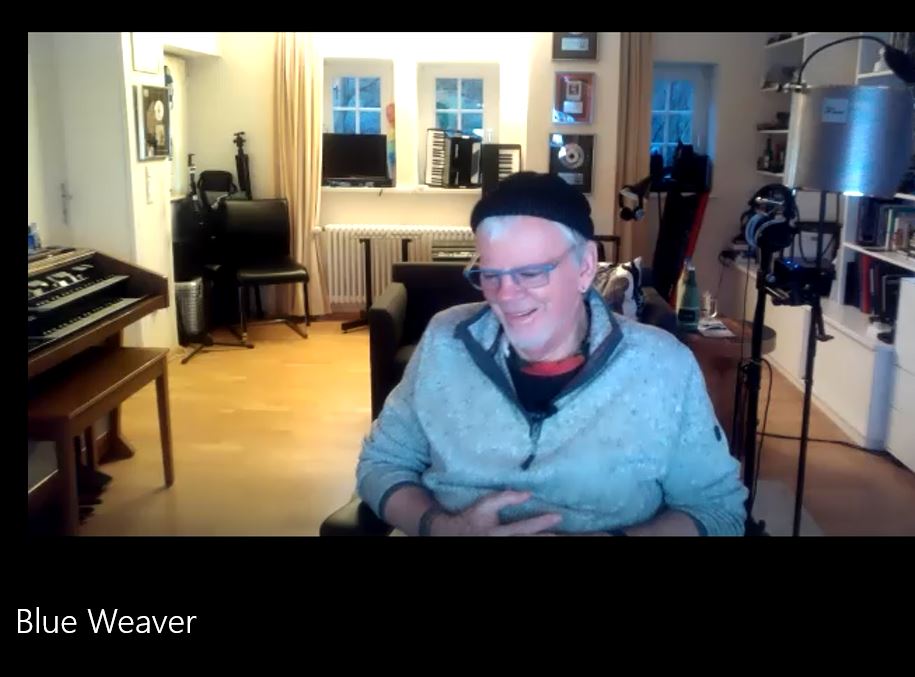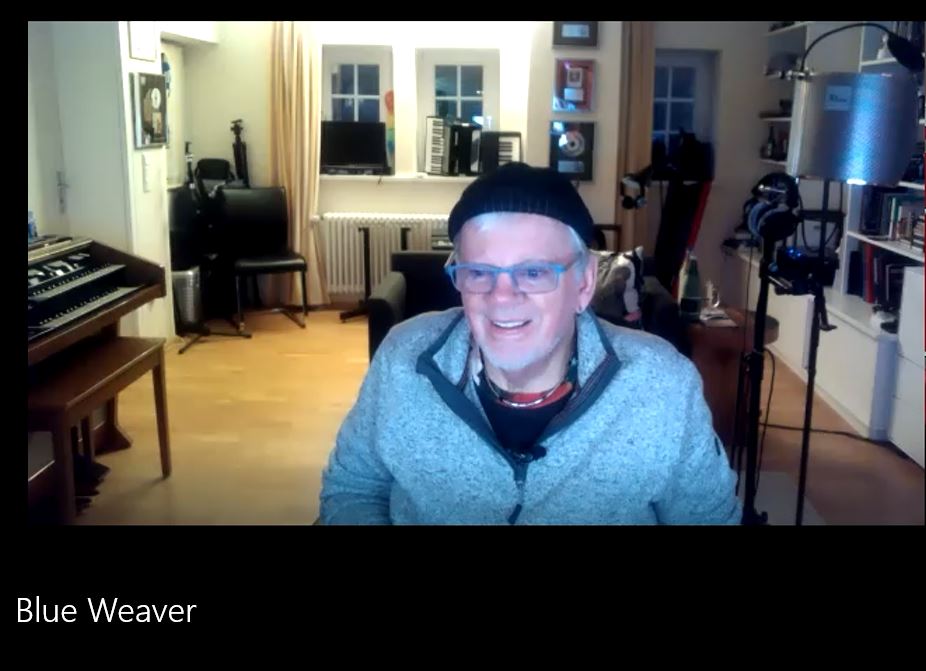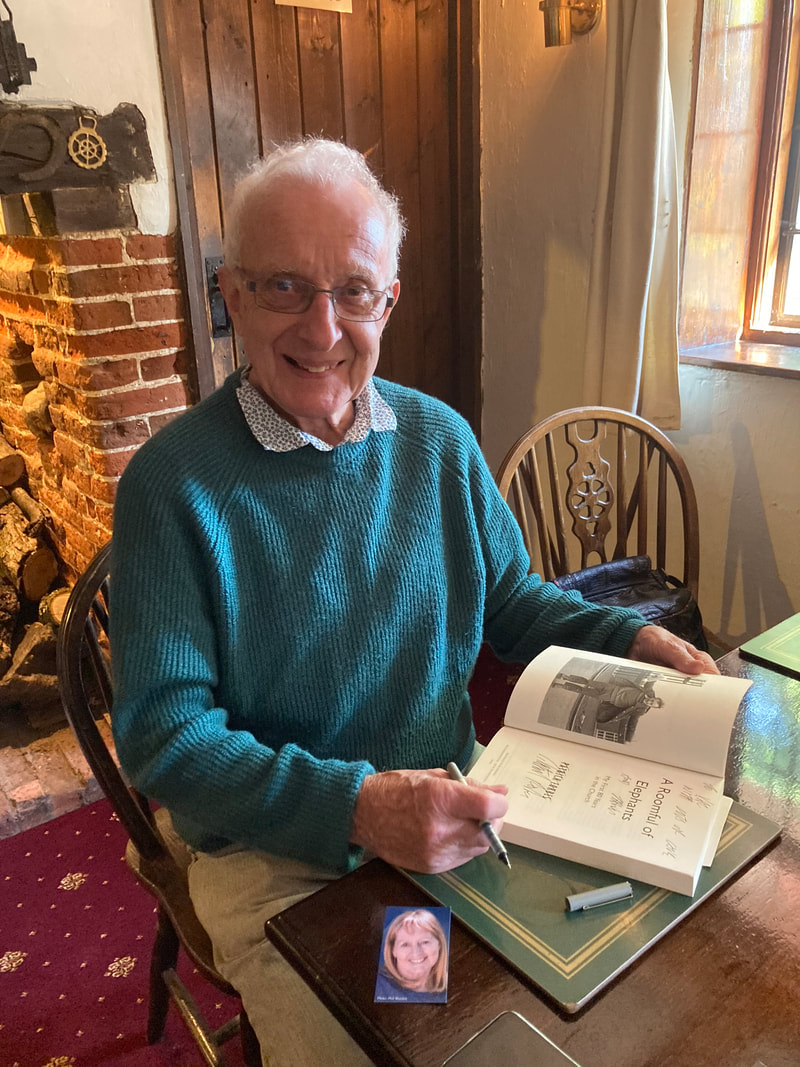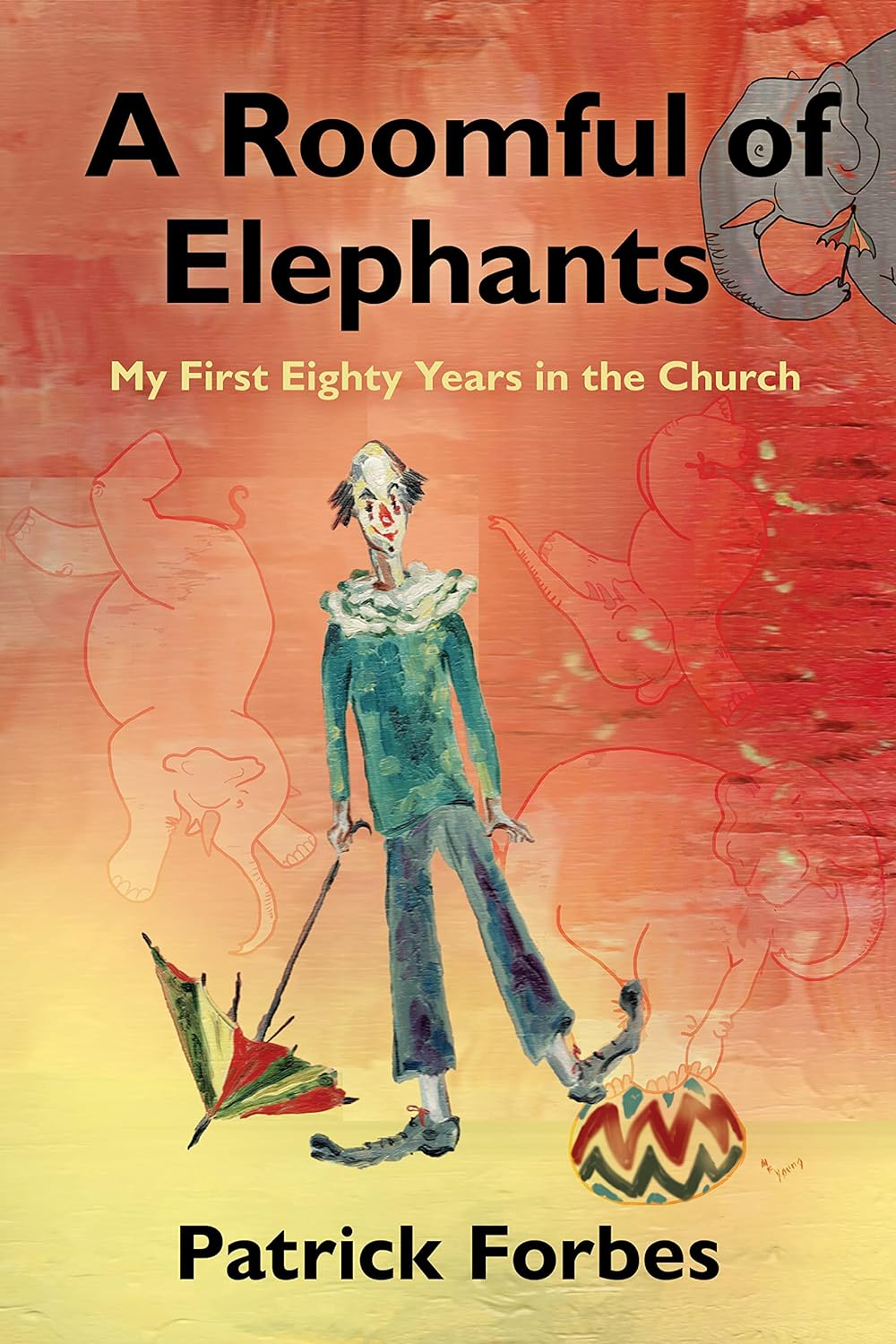Zoom interview with Blue Weaver
For those who don’t know, according to Wikipedia, Blue Weaver is a Welsh keyboardist, session musician, song-writer and record producer. He was a founder member of Amen Corner and was part of the Strawbs and the Bee Gees and also toured with Mott the Hoople.
Blue Weaver has of course done so much more, as I discovered recently and I’m now very excited to be sharing his tale.
I first met Blue back in 1967 when he was in the band Amen Corner. They were signed to Galaxy Entertainments, a management and booking agency I worked for as Junior Secretary and Receptionist. I got to know the band members well as they came into the office frequently and I was fortunate in getting to see them perform numerous times and occasionally got to hang out with them socially. I also got to dress up in a Welsh costume as part of a publicity stunt, which was great fun and have a photo to prove it!
I lost contact with Blue in the following decades, but we rekindled our friendship when Facebook came along. A few years ago I got to see him perform in Berlin during the tour of ‘Massachusetts’, a show celebrating the music of the Bee Gees, featuring the Italian Bee Gees, three brothers dedicated to performing Bee Gees music. Blue was invited to perform as a special guest and he eventually managed to pursued Dennis Bryon his former Amen Corner and Bee Bees band mate to join the tour. I guess this was Blue returning the favour as it was Dennis who persuaded Blue to join him in the Bee Gees back in 1975.
I got to have a quick chat with Blue and Dennis backstage, but because of the schedule of the show there wasn’t much opportunity to question Blue in detail about his music career following the Amen Corner years. So when the pandemic and world wide lockdown came along it was a great opportunity for me to fill in those gaps when we had a chat on Zoom.
ZOOMING IN ON BLUE
Technology is a wonderful thing and applications like Zoom conferencing have been such a blessing in recent times.
I wondered how Blue had coped during this challenging and restrictive period in our lives.
Our generation (those of us from the 1960’s and now in their 60/70 years) have often had to learn, adapt and embrace new technology. This is particularly relevant to the music and entertainment industry.
During lockdown these professions have adapted against the backdrop of Covid restrictions and the challenges of trying to keep working and earning a living.
For Blue though, he feels it’s not been a real problem for him as he started using technology back in the 60’s with the introduction of synthesisers and, being a keyboard player, this was something he was interested in.
In the 1980’s with the introduction of computers and the very first samplers that came out, one of them being the Fairlight which originated from Australia. Blue was fortunate in having one of the first Fairlight systems when he was in America working with the Bee Gees. When he left the band and moved back to London, he built a studio around it as everything in the 80’s was done around the Fairlight.
Although it detracted from his career as a musician, it didn’t matter as he was also interested in music production and was something he found he wanted to do. Not only was Blue one of the first to have the Fairlight, but one of the few that knew how to use it. Blue points out that it was also very expensive to purchase back then.
“It actually cost more than my house” he added.
Access to this type of technical equipment became more affordable when the Japanese companies took over this market and copied the technology. It really made sampling more affordable for everyone in the music business. Going from around £60,000 to just around £1,000 for one instrument made a huge difference. Blue explained how this has helped during more recent times.
“It allowed me to keep my involvement with computers and music because it enabled me this year particularly to do a whole album virtually with the Strawbs as I produced it from my studio here at home in Germany in my music room”
This is where Blue spends most of his days, well, and most of his year during lockdown.
I ask him his feeling about the Covid situation that unfolded in March 2020.
“Well gigs and tours got cancelled. I’ve been touring with the Italian Bee Gees for the last 8 years and that was a regular winter tour every year. I would also have other gigs as well during the year, so that stopped. Then here where I live in Worspede, Germany, we have an incredible Music Hall, one of the few very special live music venues in Germany and it had to close and cancel all events. The venue is like going back in time. We can get 500-600 people there and people come from all over the world, including musicians and artists. It’s been going for 20 years now. Famous people love to come here and play, all the old bands, I’d get my old friends here to perform. And that’s had to stop as well.”
Blue adds: “We’re not in complete lockdown here, but for almost a year we haven’t been able to have gigs. We had an outside concert at the end of the summer which was really good. All the rules were observed. We had about 300 people in a car park. One local artist did a concert and that raised a bit of money. We’ve been lucky enough to get grants for the Music Hall and we’ve also been told we’ve got funding for an air-filtration system into the hall. This means when we’re at a stage where its viable and safe to have people in the venue again, we’ll have everything in place.”
I mention that some musicians were planning and hoping to return to gigs again by May/June, but Blue wasn’t sure.
“I can’t see that happening this year at all, hopefully I’ll be wrong. Maybe they’ll be outside gigs.”
What about the vaccine? Has Germany started rolling it out yet?
“I’m second in line for my age group (Blue is 74) I’ve been told I won’t get it before the end of March at least. But there are centres here already doing it.”
Blue describes the location where he lives:
“We’re close to farm land here. If I look out, I can see fields at the back, and we have a mountain in the middle of our village 65 metres high! It’s called The Weyerberg, which is a sandy geest island. When there’s snow it takes 15 mins to drag a sleigh up there and then 2 minutes to come down!”
I wondered how Blue came to settle in Germany.
“I met my wife Sigi in 2002 in a village close by and I’d come over and visit and stay longer and longer. We got together in 2004, but I had a house in Spain then. We ended up moving to Spain for 10 years. While we were there we’d come back to the village to visit and I said if ever we have to go back to Germany, or Sigi got home sick, I didn’t want to go back to the village where she was living then because I’d discovered the Music Hall in the town we now live.”
Blue explained that he thought it a better place to be based with all the music that was happening there, especially with English and American bands.
He goes on to explain.
“While we were in Spain our friends here in Germany were keeping an eye on a plot of land right in the centre of the village and then 8 eco-houses were built there, two were just one bed, small places but we decided to buy one, so we had a base in Germany. Then in 2012 when I started playing with the Italian Bee Gees all the work was in Germany. Our house in Spain was not really a house we could just close up and leave. We had land with Olive trees, oranges and we had to be there to tend the gardens. The house was a full-time job to look after. It ended up that we were gone for six months of the year. It was difficult, but fortunately we had a neighbour who’d look after it for us.”
“But the more I got involved in music again the more viable it was to be living in Germany. I sold the house in Spain within a couple of weeks. Luckily, I found an English guy who fell in love with it. We moved to Germany in the little house, but gradually we found it wasn’t viable for me to work in as it was basically just one area downstairs. Our neighbours had a room that was a garage converted into a business. They said it would make a great studio for me, so we were going to move to a larger house across the road. Then there was another older house the owners were going to buy, but couldn’t. It was a house with old beams and small windows, and I thought they’d be old people living in there and it’ll need a lot of work inside and it’ll be all dark.”
“I kept saying no I wasn’t interested, and they got the family living there to invite us over for drinks. This was the first week in January and I was going on tour the following week, so we went over. When they opened the door and we got inside it was the complete opposite to what I imagined. It had been completely modernised. It still had the old character, but they’d opened up the whole back of the place, put a lot of glass in. I looked at Sigi, we thought how are we going to do this.”
“It had been two houses once, one for the parents and the other side for the son. The people we’d bought from had put back into one big house. Although still basically two houses, so I can isolate myself here.”
We return to talking about the impact of the pandemic and lockdown on musicians. For many it has meant rethinking the daily routine or new ways of working as a musician. I ask Blue if it has been a challenge for him.
“No, not really. Even when I was living in Spain, I was doing things over the internet, 12-15 years ago. We discovered that if we’re using the same programmes or similar, someone could send you a track and ask me to put piano on it or put synth on it. Then I was doing the same with things I was doing. So, it’s not something that’s completely new for me.”
For Blue he has been able to focus on a new Strawbs album called ‘Settlement’.
Blue explains the history behind producing it.
“It was the Strawbs 50th anniversary in 2019 and they’d always been big in America, but very popular in Canada too. Also, the Mayor of Lakewood, New Jersey is a huge fan and they had a great theatre in Lakewood (The Strand), and he gave us the theatre to have a special event. It was over 3 days and people from all over the world bought tickets and stayed in hotels close by. The concert started at 11am in the morning until 11 at night for 3 days! We went through all the different incarnations of the Strawbs.”
Blue was asked to help with a special project around the 50th Anniversary concert.
“We wanted to do the whole of the Grave New World album, which was the first album I did in 1971 with the Strawbs and to recreate that live and re-record it and video it. Dave Cousins (leader of the Strawbs) came over to my house in Germany before the concert and we ran through and did some rehearsals just the two of us and worked out what we’re going to do. I did various things as well over the days with other musicians that had been involved with the Strawbs. Then Dave saw what set up I had here after we recorded this and said well it’s obviously very expensive to hire a studio and for people to do all their stuff after you’ve got all the tracks down. We’d recorded over three days both audio and video. Dave said to me you’ve got a perfect set up here so will you mix the live album? I said yes.”
“Back in the end of 2019 when I started mixing the live album, Dave called me and said Cherry Red, the record label, wanted a separate album before the end of the year. I think a lot of facilities they used were in France, so because of Brexit they didn’t know what the consequences were going to be when Britain left the EU. They said, let’s get another studio album together so that we can get everything together before Brexit at the end of the year. Dave called and said would you produce this new album for the Strawbs. I said great. I had to stop mixing the 50th Anniversary live album and concentrate on getting the other album done.”
‘Settlement’ is now out, released on 26th February and available on Vinyl, CD and streaming.
Blue continues:
“The vinyl was an interesting thing for me to have to mix and produce vinyl again, as its not forgiving. It’s a special art actually. Obviously throughout my career I’ve been involved in vinyl, but we always had a master engineer and producer who knew what they were doing, this meant I had little bits to learn. I’d always taken an interest in production. When we were working in Criteria Studio (Florida) all those years with the Bee Gees and the mastering was in Criteria, anytime we had to do anything we would go in and ask questions.”
With the announcement of the Strawbs ‘Settlement’ album release there was an eager fan base waiting around the world. It extended beyond just the Strawbs’ fans because of Blues involvement with the Bee Gees, plus his role as a band member with Amen Corner. Despite the Strawbs style of music being so different to both Amen Corner and the Bee Gees, Blue’s fan base is equally excited.
Blue then reflects on his days in his previous bands.
“The Bee Gees and Amen Corner were more pop, whereas the Strawbs came from a bluegrass background, which turned into folk, folk rock and some say progressive.”
Blue prefers the folk-rock flavour because it’s still a little pop in a way. One of their biggest hits was the pop song “Part Of The Union” which I remember well. It’s one of those songs that once you hear it, you just can’t get out of your head!
“You couldn’t get more pop than that”. Blue says ”The band knew it was going to be a hit so couldn’t resist releasing it. It’s basically a folk song telling a story, but the great thing was, nobody knew who it was for, whether it was for the Labour party, the Unions, or the Conservatives against the Unions. So, we played it right down the middle. It was a song that could be for whatever you wanted. Could’ve been tongue in cheek against the Unions, or for the Unions, it didn’t matter.”
Blue explains his involvement with the band in more recent times.
“I’ve always done special performances with the Strawbs over the years. Once you’ve been with the Strawbs you never really leave. There may be other musicians there performing with them, but I’ll always get back to do things like the 50th. I did the 25th and the 40th.”
Blue also toured with Mott the Hoople all over America after the Strawbs split up.
“I was never part of Mott the Hoople. I was just a guest. That was after the Strawbs split up. In 1973 when the Strawbs split I had a house, mortgage and family, but no work. All the bands equipment had been sold so I couldn’t work. I was absolutely broke. I got an article in the NME about it, but then they got a legal writ preventing them from writing more about me, and I didn’t have any money to go to a lawyer. I was completely broke. I was driving a mini cab, listening to our number one and Lay Down had just been out.”
The Strawbs first hit single had peaked at number 12 in the UK singles chart in 1972.
Blue adds:
“It was still being played on the radio and I’m driving a mini cab. It was a job I could do though, and I could say I can’t come in tomorrow and I’d go around the studio and hang out. That’s how I ended up on a Lou Reed album. Producer Bob Ezrin just happened to be producing the ‘Berlin’ album as I was hanging around a studio in Wilsden. It had a bar which was a dangerous thing at that time.”
Blue goes on.
“I didn’t have much money, but I’d buy half a pint and make it last about three hours. Towards the end of one evening Bob Ezrin walked into the bar and said, Blue, what are you doing? He liked the Strawbs and when we were in Toronto he’d come along and see the gigs. He’d produced Alice Cooper, in fact when I was in the Strawbs, Alice Cooper was in Morgan Studios doing Billion Dollar Babies. ”
Blue believes he played the Mellotron on that album.
Bob Ezrin bought Blue a drink and said, “I’ve got some guys in the studio and they want to jam to warm up before the session starts, why don’t you come in and sit with them and just play.”
Blue agrees and heads for the studio.
“As I’m walking through the studio door, Steve Winwood is walking out. I looked and thought no way, I don’t do this sort of thing, thinking, this is out of my league. I look around and there’s Jack Bruce on bass, Aynsley Dunbar on drums. This was Lou Reed’s band! I recognised them. Steve Hunter, he played an incredible solo on Sweet Jane.”
Blue was thinking. “No, these are all incredible musicians. I sat in front of the organ and they say, just have a play around and see what you think. They started playing a song and said we need some piano on this. Then in walks Lou Reed! This was the Berlin album they were working on.”
Blue featured on Men of Good Fortune. I asked Blue if this was his introduction to doing session work?
“No, I’d always done session work. When I was with Amen Corner, I realised that Amen Corner was like one of Andy’s cars, it was a vehicle to get somewhere. Amen Corner was formed as a band, but when we got to London obviously Andy was the front man and Amen Corner became Andy Fairweather Low and Amen Corner. I realised this from the start.
Modestly Blue adds.
“When I was in the studio, I realised I was never a great musician, I was never a great keyboard player. There were so many in the 60’s far better than me, so I never tried to be a soloist or do solos. I sat back and did what was necessary to make a good record and make them sound good and not think what can I do for myself? I always enjoyed playing and I’d always get the opportunity like when you’d be in the studio if there was another band in the studio that didn’t have a keyboard player, I get to do those sessions.”
“But gradually as I did things I learnt to only do what was necessary and not try to be flash and do all this solo stuff. That way I got to get quite a bit of work. I turned down some gigs because I knew the people that did those gigs regularly there is no way I could do the same as them. It would be an embarrassment for the band and for me to get there and not give them what they wanted.”
Blue also feels he’s not a great singer, although he wrote a beautiful song following the death of Robin Gibb called, We Are One. He hasn’t and won’t find a singer to cover it as he had one person in mind when writing it and hopes that person will get around to finishing it and recording it one day.
Blue explains:
“I was in Spain and just heard that Robin had died (May 2012) I was getting phone calls and interviews to do. One day shortly after that I sat down at the piano and it was something in a sentence that Barry had said in an interview about now, I’m the only one.
I’m not a lyricist, but, as I sat down at the piano this lyric came to me.
“I’m standing on the stage alone” so I wrote it down.
Then Blue plays his wonderful melody to me to demonstrate how it goes. I am speechless as it is so beautiful.
This was taken from Blue’s website:
http://saturdaynightweaver.com
I’m standing on this stage alone,
Another spirit not yet flown,
But when I look around I see,
All my brothers standing next to me,
and singing harmony,
and when that final song is sung,
now We Are One…
I then sat at my piano and came up with this melody.
I tried writing other words but nothing touched me as much as that final verse that I had written and I realised there was really only one person who could finish it and sing it…
I always imagined this would be an orchestral track maybe with some piano hopefully one day it will be completed. I am never happy with my performances as I really wish there was ‘someone’ there to sing it for you.
I believe now more than ever especially with what’s happening around the world we need to stand together as one…
PS. I performed a medley of songs on our wonderful Worpswede Musichall Bosendorfer for friends and family for my 70th birthday and I keep looking around in surprise as all my grandchildren joined me onstage and this was the final very emotional song…
Blue points out to me.
“The song is geared for Barry, but I did perform it with the Italian Bee Gees here in Worspede when we did an unplugged show to raise money (11 years ago now)”
Blue then goes on to explain about how he helped to raise funds for a new piano for the great music venue in his town that he spoke to me about earlier in our chat. (https://musichall-worpswede.eu/)
“ The Music Hall needed a new grand piano. I loved the old one from 1909, so I bought that to help with financing as we had to raise money to buy another one, a more modern piano that was more suited to a wider range of music. It was incredible because the lady in charge of the music hall knew an old lady who had a grand piano that’s all covered up and not used anymore and suggested maybe we should go have a look at it.”
Blue adds intently.
“So, we went and there was this grand piano which was the same size that we needed to fit on the stage where the previous one had been. It was all covered up with a black cover. I thought oh gosh and asked what sort it was, but the owner wasn’t sure. So, I lifted the cover then I lifted the top of the keyboard and I looked, and it said ‘Bosendorfer’! I looked and said this is a great piano. The owner said it would probably sound horrible as it hadn’t been played for years. So, I played it and it was unbelievable. I won’t say how much it was, but we said we’d see what we could raise and would give what the owner wanted for it, and more on top. It’s amazing how supportive everyone in the village was and they came from Hanover and Hamburg and other places in Germany to see concerts here with people being really supportive giving money. Then I did a concert with the Italian Bee Gees and finally we managed to raise the money we needed. I now have the most amazing piano, an old one, and we also have an amazing new one for the Music Hall.”
Blue continues.
“What is interesting is that Yamaha bought and took over Bosendorfer in 2008. Bosendorfer originally had their own forest farms where they would cut the wood down and keep it a while before they would use it to make their pianos. So, they had all this wood in storage and had a fire and lost everything. So, the one we have is one of the last pianos, from 1981, to be produced. I believe those from 1982 onwards are still from Bosendorfer but the company is now owned by Yamaha. For those who recognise the brand, and can play it, will use it. Sometimes there is not enough room for a band to set up on stage, but those who would normally use a piano will use this one. It’s amazing.”
We talk about concerts and performances Blue has been involved in prior to the Covid crisis.
“Before the lockdown, Robin Gibb’s son RJ (Robin John Gibb) got in touch with me saying he was trying to put a showcase together of Bee Gees songs and was I interested in doing something with him. I went over to London and did a concert just to try out to see what we could do. It was really successful. I told RJ that if you’re doing Bee Gees songs there’s only 3 fellas that it would work with and that’s the Italian Bee Gees. So, we got them over and did a concert with them which turned out to be really good as well.”
This was held at the Bloomsbury Ballroom, an Art Deco venue in London. The idea behind the show will be to make it progressively something bigger and possibly in the end turn it into something that would work well in Vegas. To make it a real spectacular show of Bee Gees songs, that would include the Italian Bee Gees with RJ performing some songs and have special guests along to do their favourite Bee Gees song, then perform with the rest of the line up, including the Italian Bee Gees, RJ and Blue as well as other musicians.
Blue excitingly announces they have already booked concerts in Denmark and Sweden and hope to extend this to other countries for 2022.
Recently the Bee Gees had a boost of interest when Barry Gibb announced he was teaming up with various country artists to record various Bee Gee songs for an album called ‘Greenfields: The Gibb Brothers Songbook Vol.1’ released in January 2021.
Blue adds.
“Bee Gees music is timeless. Some song s created during my time were deliberately produced to be able to dance to. That was the thing when I first joined the Bee Gees. The brief was something new had to come along. “
Blue explained that with the Italian Bee Gees they were getting three generations of people along to concerts, including grandchildren. Saturday Night Fever had become a bit of a cult movie, so it resurrected all that interest with songs like Staying Alive and Saturday Night Fever.
Blue says “I’ve been to a number of venues where heavy dance oriented music has been playing, although I hate putting music into categories, but then on comes Staying Alive and everyone goes crazy. This music has never really gone away. The way we created those tracks meant that DJ’s could take stuff from the 70’s put it on their decks and mix with it because we recorded to a click track so there is strict timing, which is perfect so that DJs can take that and do lots of stuff with it because the timing doesn’t vary. It was created for dancing to.”
Blue’s time with the Bee Gees was obviously a very special time for him.
“When I joined the Bee Gees, they were great at writing songs and did great things with orchestras, but it wasn’t happening. They did an album which was a really good album with Arif Mardin producing it, but the album didn’t sell and the concerts they were doing weren’t doing so well and were very expensive to put on with an orchestra, so the brief was something new had to come along.”
Blue has always been interested in the process of music production and the way the tracks are conceived.
“With the bass sound in Jive Talking we knew this was a completely new sound for the Bee Gees. They were brilliant at writing for other people too, like Diana Ross and Barbra Streisand”
“In 1975 Barry would pick up on things I’d like to do. I’d written a chord sequence, a melody, about 3 years previously when I was in the Strawbs. I was playing it one night when we were staying in 461 Ocean Boulevard, Miami. This is where Eric Clapton stayed and named his album after.”
“Infact, Clapton had said to us; guys, you must go to Miami to record and stay at 461. You have a great environment and a great studio (Criteria). There was a brilliant old piano there so we could rehearse and write. I was just playing that chord sequence one night and Barry came along and asked, what was that? He asked me to play it again, so I did. What is amazing about Barry is that generally the first words that come out of his mouth are usually the hook, or end up in the song, and he came up with (Blue plays chord and sings) “Go on with your song-bird you can’t go wrong bird. You will go on and on bird, like you did before.”
Songbird
Bee Gees
Go on with your song, bird -- you can't go wrong bird
You will go on and on, bird, like you did before
Though your wings are broken the sky is so wide open
And the wind is waiting for you like an open door
Though you go so far away, your voice will still be heard so well
You'll never really ever know how beautiful you are
When the moon is on the rise, I'll try to make my songbird fly
I wonder if he ever will -- and if he really did, how far
Go on with your song, bird -- you can't go wrong bird
You will go on and on, bird, like you did before
Though your wings are broken the sky is so wide open
And the wind is waiting for you like an open door
Though you go so far away, your voice will still be heard so well
You'll never really ever know how beautiful you are
When the moon is on the rise, I'll try to make my songbird fly
I wonder if he ever will -- and if he really did, how far
Go on with your song, bird -- you can't go wrong bird
You will go on and on, bird, through the open door
Go on with your song, bird -- you can't go wrong my bird
You will go on and on, bird, like you did before
Like you did before
Main Course album 1975
Songwriters: Maurice Ernest Gibb, Robin Hugh Gibb, Barry Alan Gibb, Derek John Weaver
Blue continues:
“Then I forgot about it and we came close to finishing the album when Barry said, oh we’re going to put that song on the album (Main Course). I also had another one included on the next album; The Way It Was (Children of The World). The first title was called The Restless Years, but somehow it got changed, I don’t know why. I think the publishing company changed it to The Way It Was, which I thought was confusing with The Way We Were, but something good came out of that. One day I was in a record store in Miami going through records, and with Amen Corner we used to do numbers by Gladys Knight and The Pips, and I was going through some vinyl and came across Gladys Knight’s Greatest Hits and I see a song “The Way It Was” thinking it was a misprint of ‘The Way We Were’ because she had a huge hit with that. Then I looked at the writers and it said Barry Gibb and Blue Weaver! I couldn’t believe it. It turned out that Gladys Knight had performed it at a live concert that was recorded and included on this album.”
Blue was really chuffed to have one of his favourite singers record one of his songs.
He is obviously known as being a founder member of Amen Corner, a member of Bee Gees and for his work with Mott The Hoople and Strawbs, but it seems his music production skills get little acknowledgement.
Blue explains: “It’s a long story. After Jive Talking, and after the ‘Main Course’ album produced by Arif Mardin, he was scheduled to produce the next Bee Gees album in January 1976. We flew to Miami and when we got there we were told he wouldn’t be producing the album because Robert Stigwood had pulled distribution from Atlantic. Arif and Stigwood were friends so Stigwood wouldn’t let us use their producers. There we were in Miami about to do a new album and didn’t have a producer. We looked at the best we could get and thought of Richard Perry, LA producer. We contacted him and he agreed.”
This meant them going to Los Angeles.
“ We found a house to stay and go into the studio. We’d just come up with the idea of ‘You Should Be Dancing’ but Richard was so laid back. He’d recently returned from some retreat and he was in shorts, the sort you have if you’re playing tennis and being all chilled out. We’d be in the studio doing a take, then we’d wait for a response from Richard, but there was nothing, no feed back from the control room. We’d ask what it was like and the response was, well, what do you think? “
Blue indicated that it’s not really what they were looking for.
“It’s not that he’s not a great producer, but it just wasn’t right for us at that time. We had different musical directions, so we went back to Miami to finish the album. It took us 6 months doing that album.”
Children of the World came out in 1976 (Recorded 19th January and finished 6 May 76)
Blue assisted, but got no production credit, although it went to the Bee Gees which, of course, Blue was part of. Also credited was engineer Karl Richardson and Albhy Galuten.
But Blue has since had other opportunities to prove his production skills, especially with his long-term friend Brian Parrish.
“I’ve known him from the Speakeasy days in the 60’s. He married a German lady too and moved to a village near me. He’s got a place at his house. He’s got a hearing problem, so I helped him because it’s difficult for him to mix in stereo. We had this thing where I’d mix his tracks and I would even play on some of them.”
Blue has also produced some of Brian’s videos, something Blue was getting into at the time.
“I thought this would be fun, so I started making videos for him. I’d buy programmes to do it, but now just use the iPhone. Its amazing what you can do. One of Brian’s recent videos ‘Shadowman’ was recorded on my iPhone then I put it into my computer. If you go to my YouTube channel, there are other videos I did for him. Some are pretty straight. With this one I tried to do it differently. I like to experiment. It’s a learning process for me as well and I can see what I can do.”
This far into the conversation I realise just how much Blue likes to challenge himself, so I was not surprised when he leads on to tell me about his involvement with a young rap, hip hop, beat artist (not something I know anything about, so will let Blue do the talking!)
“It was about 2 years ago, and this guy came walking down the street towards me and said oh, excuse me, are you Blue Weaver? My name is NASIIB, I want to learn all about music, and I want to learn how to record in the studio. I do beats.”
“He had examples, but I said I was busy at the moment so there’s nothing I can do as I was touring a lot at that time. Anyway, he got back in touch again about a year ago and I got him over to the house and we sort of made friends. He’s great and played me his things and I got interested in it. Finding out how hip hop is structured and especially how he was creating his beats.”
I ask Blue to describe what it means.
“He’ll take old vinyl records and take a little bit of a kick drum and a little bit of a snare, so he’ll take lots of bits from different sources to create one beat. I’ve only got the finished tracks, but I tried to turn it into a song.”
“There were these Philadelphia rappers who were having hits when they were 12 and 13, then something happened, and they couldn’t do anything for a number of years. So NASIIB, our beat master got in touch with them and asked them to send us a rap. We sent them the beat and they just did their rap over our beat. I made something up around it and we created a track.”
“Now it’s had a million plays on Spotify. We’ve done a vinyl track as well. What I did was introduce strings into it, which they said no you can’t do that, and I said well I’m doing it.”
I’ve listened to the track on Spotify and definitely feel Blue’s strings adds a special layer to the track. Go check it out. It’s called ‘Be Great’ featuring Da Youngsta’s, NASIIB and Blue.
Blue adds:
“NASIIB and I work on this together and he’s incredible at contacting so many people. We’re working with Prodigal from Wu Tang Clan. NASIIB finds out how to contact these guys and will just phone them up and say these are my beats and sends them stuff. Amazing he actually gets them to phone him back. I’m here with him working at night while he’s having video conversations with people like Michael Jackson’s nephew (Jermaine Jackson’s son). We sent him some stuff and he’s now working on something.”
We reflect on the fact that Blue, now 74-years-old, is dabbling in Hip Hop. Not something I would’ve expected, but find it very cool.
Of course, there are lots of examples of older musicians still working and using their knowledge and skills to create music, often working with younger musicians. I find that inspiring.
Blue points out that Dave Cousins is a good example of an older musician still writing, singing and still creating great music. Blue feels the ideas Dave comes up with and his guitar playing is unique.
Blue plays me an example from the new Settlement album. I am moved at this beautiful sound created.
“This was one of the first tracks he gave me to do. He sent me the guitar part and that’s all I had to work on then, so I put strings to it and I actually ended up playing a little bit of piano, which is so simple, but one of the best things I’ve ever done. Dave’s guitar at the end is incredible. It’s the open tuning he uses. It’s going to give the Strawbs a new audience. He’s done all the vocals in his bedroom. He put mattresses up in the room to dampen the sound and playing his guitar live into a Zoom recorder. He would send that recording to me and I would add bits to that.”
“It’s incredible what we achieved and the way it was achieved and with that equipment. When I listen to it and when I figure out and realise how we came to do it I am really excited. It’s great that it’s actually with a band that helped take me into another direction musically.”
“When I was with Amen Corner, which, as you know, was classed as a teeny bopper pop band. We were just into the music when we first started, but Ron King, our manager and agent, realised he had these 7 (Blue laughs) well 6, no 5 relatively good-looking guys and two exceptionally good-looking guys. Ron thought gosh I’ve got something here, they can’t be a soul band they’ve got to be a pop band. But it was great that we could combine both. Remembering all those first concerts we did for Ron at Wykham Hall and how the audiences went crazy.”
At the time Blue admits they just wanted to be known as a good band rather than a teeny bopper band. Amen Corner morphed into Fairweather with just five band members now. Having a brass section became expensive to have a large entourage on the road touring.
“It was during this time that I got disillusioned with the whole thing and I could see it was Andy’s thing really and one day he was going to go off on his own. I was the first to leave Fairweather when I went off and had no other gigs and the manager of Speakeasy Laurie O’Leary told me The Strawbs needed a keyboard player. I’d never heard of them, but I’d misheard and thought he said The Thugs. I looked them up and thought, what was he thinking! Laurie kept on at me and mentioned the Strawbs again and I thought oh, I thought you’d said The Fugs! Then I looked up the Strawbs and saw that Rick Wakeman had been their keyboard player but recently left.”
Blue was thinking “there is no way I could replace Wakeman, I’m not that type of player”. Laurie kept on and one day a car turned up at his door to take Blue to a Strawbs audition. He was taken up to Hounslow and met Dave Cousins, lead and guitarist. First thing Blue explained was he couldn’t play like Rick, but they said that’s ok, do what you can. Blue asked if there is anyone else that could do it and they said they’d tried. Blue was asked “do you drink beer, and do you eat curries?!”
“Definitely!” Blue said.
“We went across the road to the White Bear and had quite a few drinks, then went for a curry just down the road.”
Blue suddenly realised they had not heard him play. So, they went back to Dave’s front room where he had an old piano.
“I don’t know why, but I played some Dave Brubeck and they said it was ok as two weeks’ time we start rehearsals anyway. That was it.” Blue was in.
So, now the ‘Settlement’ album has now been released what’s next for Blue?
“I’m working on the Strawbs 50th Anniversary live album. I am still producing that, but have to finish it. I’ve got to listen to all the tracks and fix some of the inherent problems when you have so many musicians on stage and then an orchestra and a choir. I’ve got to go through the tracks and get them sounding as good as I can. It would be nice to get that ready for the end of the year. There is no real deadline, and the new album Settlement has to be promoted first.”
Blue added, “People are always interested in live Strawbs albums so I’m confident it will be ok.”
So, there we have it. The tale has been told.
From Teenybopper pop to rocking with Mott
From Bluegrass folk rock to Hip replacement Hop Rap
Talking jive with the Bee Gees on the disco floor.
Blue is the man who will never stop, making music.
Amen to that!
For those who don’t know, according to Wikipedia, Blue Weaver is a Welsh keyboardist, session musician, song-writer and record producer. He was a founder member of Amen Corner and was part of the Strawbs and the Bee Gees and also toured with Mott the Hoople.
Blue Weaver has of course done so much more, as I discovered recently and I’m now very excited to be sharing his tale.
I first met Blue back in 1967 when he was in the band Amen Corner. They were signed to Galaxy Entertainments, a management and booking agency I worked for as Junior Secretary and Receptionist. I got to know the band members well as they came into the office frequently and I was fortunate in getting to see them perform numerous times and occasionally got to hang out with them socially. I also got to dress up in a Welsh costume as part of a publicity stunt, which was great fun and have a photo to prove it!
I lost contact with Blue in the following decades, but we rekindled our friendship when Facebook came along. A few years ago I got to see him perform in Berlin during the tour of ‘Massachusetts’, a show celebrating the music of the Bee Gees, featuring the Italian Bee Gees, three brothers dedicated to performing Bee Gees music. Blue was invited to perform as a special guest and he eventually managed to pursued Dennis Bryon his former Amen Corner and Bee Bees band mate to join the tour. I guess this was Blue returning the favour as it was Dennis who persuaded Blue to join him in the Bee Gees back in 1975.
I got to have a quick chat with Blue and Dennis backstage, but because of the schedule of the show there wasn’t much opportunity to question Blue in detail about his music career following the Amen Corner years. So when the pandemic and world wide lockdown came along it was a great opportunity for me to fill in those gaps when we had a chat on Zoom.
ZOOMING IN ON BLUE
Technology is a wonderful thing and applications like Zoom conferencing have been such a blessing in recent times.
I wondered how Blue had coped during this challenging and restrictive period in our lives.
Our generation (those of us from the 1960’s and now in their 60/70 years) have often had to learn, adapt and embrace new technology. This is particularly relevant to the music and entertainment industry.
During lockdown these professions have adapted against the backdrop of Covid restrictions and the challenges of trying to keep working and earning a living.
For Blue though, he feels it’s not been a real problem for him as he started using technology back in the 60’s with the introduction of synthesisers and, being a keyboard player, this was something he was interested in.
In the 1980’s with the introduction of computers and the very first samplers that came out, one of them being the Fairlight which originated from Australia. Blue was fortunate in having one of the first Fairlight systems when he was in America working with the Bee Gees. When he left the band and moved back to London, he built a studio around it as everything in the 80’s was done around the Fairlight.
Although it detracted from his career as a musician, it didn’t matter as he was also interested in music production and was something he found he wanted to do. Not only was Blue one of the first to have the Fairlight, but one of the few that knew how to use it. Blue points out that it was also very expensive to purchase back then.
“It actually cost more than my house” he added.
Access to this type of technical equipment became more affordable when the Japanese companies took over this market and copied the technology. It really made sampling more affordable for everyone in the music business. Going from around £60,000 to just around £1,000 for one instrument made a huge difference. Blue explained how this has helped during more recent times.
“It allowed me to keep my involvement with computers and music because it enabled me this year particularly to do a whole album virtually with the Strawbs as I produced it from my studio here at home in Germany in my music room”
This is where Blue spends most of his days, well, and most of his year during lockdown.
I ask him his feeling about the Covid situation that unfolded in March 2020.
“Well gigs and tours got cancelled. I’ve been touring with the Italian Bee Gees for the last 8 years and that was a regular winter tour every year. I would also have other gigs as well during the year, so that stopped. Then here where I live in Worspede, Germany, we have an incredible Music Hall, one of the few very special live music venues in Germany and it had to close and cancel all events. The venue is like going back in time. We can get 500-600 people there and people come from all over the world, including musicians and artists. It’s been going for 20 years now. Famous people love to come here and play, all the old bands, I’d get my old friends here to perform. And that’s had to stop as well.”
Blue adds: “We’re not in complete lockdown here, but for almost a year we haven’t been able to have gigs. We had an outside concert at the end of the summer which was really good. All the rules were observed. We had about 300 people in a car park. One local artist did a concert and that raised a bit of money. We’ve been lucky enough to get grants for the Music Hall and we’ve also been told we’ve got funding for an air-filtration system into the hall. This means when we’re at a stage where its viable and safe to have people in the venue again, we’ll have everything in place.”
I mention that some musicians were planning and hoping to return to gigs again by May/June, but Blue wasn’t sure.
“I can’t see that happening this year at all, hopefully I’ll be wrong. Maybe they’ll be outside gigs.”
What about the vaccine? Has Germany started rolling it out yet?
“I’m second in line for my age group (Blue is 74) I’ve been told I won’t get it before the end of March at least. But there are centres here already doing it.”
Blue describes the location where he lives:
“We’re close to farm land here. If I look out, I can see fields at the back, and we have a mountain in the middle of our village 65 metres high! It’s called The Weyerberg, which is a sandy geest island. When there’s snow it takes 15 mins to drag a sleigh up there and then 2 minutes to come down!”
I wondered how Blue came to settle in Germany.
“I met my wife Sigi in 2002 in a village close by and I’d come over and visit and stay longer and longer. We got together in 2004, but I had a house in Spain then. We ended up moving to Spain for 10 years. While we were there we’d come back to the village to visit and I said if ever we have to go back to Germany, or Sigi got home sick, I didn’t want to go back to the village where she was living then because I’d discovered the Music Hall in the town we now live.”
Blue explained that he thought it a better place to be based with all the music that was happening there, especially with English and American bands.
He goes on to explain.
“While we were in Spain our friends here in Germany were keeping an eye on a plot of land right in the centre of the village and then 8 eco-houses were built there, two were just one bed, small places but we decided to buy one, so we had a base in Germany. Then in 2012 when I started playing with the Italian Bee Gees all the work was in Germany. Our house in Spain was not really a house we could just close up and leave. We had land with Olive trees, oranges and we had to be there to tend the gardens. The house was a full-time job to look after. It ended up that we were gone for six months of the year. It was difficult, but fortunately we had a neighbour who’d look after it for us.”
“But the more I got involved in music again the more viable it was to be living in Germany. I sold the house in Spain within a couple of weeks. Luckily, I found an English guy who fell in love with it. We moved to Germany in the little house, but gradually we found it wasn’t viable for me to work in as it was basically just one area downstairs. Our neighbours had a room that was a garage converted into a business. They said it would make a great studio for me, so we were going to move to a larger house across the road. Then there was another older house the owners were going to buy, but couldn’t. It was a house with old beams and small windows, and I thought they’d be old people living in there and it’ll need a lot of work inside and it’ll be all dark.”
“I kept saying no I wasn’t interested, and they got the family living there to invite us over for drinks. This was the first week in January and I was going on tour the following week, so we went over. When they opened the door and we got inside it was the complete opposite to what I imagined. It had been completely modernised. It still had the old character, but they’d opened up the whole back of the place, put a lot of glass in. I looked at Sigi, we thought how are we going to do this.”
“It had been two houses once, one for the parents and the other side for the son. The people we’d bought from had put back into one big house. Although still basically two houses, so I can isolate myself here.”
We return to talking about the impact of the pandemic and lockdown on musicians. For many it has meant rethinking the daily routine or new ways of working as a musician. I ask Blue if it has been a challenge for him.
“No, not really. Even when I was living in Spain, I was doing things over the internet, 12-15 years ago. We discovered that if we’re using the same programmes or similar, someone could send you a track and ask me to put piano on it or put synth on it. Then I was doing the same with things I was doing. So, it’s not something that’s completely new for me.”
For Blue he has been able to focus on a new Strawbs album called ‘Settlement’.
Blue explains the history behind producing it.
“It was the Strawbs 50th anniversary in 2019 and they’d always been big in America, but very popular in Canada too. Also, the Mayor of Lakewood, New Jersey is a huge fan and they had a great theatre in Lakewood (The Strand), and he gave us the theatre to have a special event. It was over 3 days and people from all over the world bought tickets and stayed in hotels close by. The concert started at 11am in the morning until 11 at night for 3 days! We went through all the different incarnations of the Strawbs.”
Blue was asked to help with a special project around the 50th Anniversary concert.
“We wanted to do the whole of the Grave New World album, which was the first album I did in 1971 with the Strawbs and to recreate that live and re-record it and video it. Dave Cousins (leader of the Strawbs) came over to my house in Germany before the concert and we ran through and did some rehearsals just the two of us and worked out what we’re going to do. I did various things as well over the days with other musicians that had been involved with the Strawbs. Then Dave saw what set up I had here after we recorded this and said well it’s obviously very expensive to hire a studio and for people to do all their stuff after you’ve got all the tracks down. We’d recorded over three days both audio and video. Dave said to me you’ve got a perfect set up here so will you mix the live album? I said yes.”
“Back in the end of 2019 when I started mixing the live album, Dave called me and said Cherry Red, the record label, wanted a separate album before the end of the year. I think a lot of facilities they used were in France, so because of Brexit they didn’t know what the consequences were going to be when Britain left the EU. They said, let’s get another studio album together so that we can get everything together before Brexit at the end of the year. Dave called and said would you produce this new album for the Strawbs. I said great. I had to stop mixing the 50th Anniversary live album and concentrate on getting the other album done.”
‘Settlement’ is now out, released on 26th February and available on Vinyl, CD and streaming.
Blue continues:
“The vinyl was an interesting thing for me to have to mix and produce vinyl again, as its not forgiving. It’s a special art actually. Obviously throughout my career I’ve been involved in vinyl, but we always had a master engineer and producer who knew what they were doing, this meant I had little bits to learn. I’d always taken an interest in production. When we were working in Criteria Studio (Florida) all those years with the Bee Gees and the mastering was in Criteria, anytime we had to do anything we would go in and ask questions.”
With the announcement of the Strawbs ‘Settlement’ album release there was an eager fan base waiting around the world. It extended beyond just the Strawbs’ fans because of Blues involvement with the Bee Gees, plus his role as a band member with Amen Corner. Despite the Strawbs style of music being so different to both Amen Corner and the Bee Gees, Blue’s fan base is equally excited.
Blue then reflects on his days in his previous bands.
“The Bee Gees and Amen Corner were more pop, whereas the Strawbs came from a bluegrass background, which turned into folk, folk rock and some say progressive.”
Blue prefers the folk-rock flavour because it’s still a little pop in a way. One of their biggest hits was the pop song “Part Of The Union” which I remember well. It’s one of those songs that once you hear it, you just can’t get out of your head!
“You couldn’t get more pop than that”. Blue says ”The band knew it was going to be a hit so couldn’t resist releasing it. It’s basically a folk song telling a story, but the great thing was, nobody knew who it was for, whether it was for the Labour party, the Unions, or the Conservatives against the Unions. So, we played it right down the middle. It was a song that could be for whatever you wanted. Could’ve been tongue in cheek against the Unions, or for the Unions, it didn’t matter.”
Blue explains his involvement with the band in more recent times.
“I’ve always done special performances with the Strawbs over the years. Once you’ve been with the Strawbs you never really leave. There may be other musicians there performing with them, but I’ll always get back to do things like the 50th. I did the 25th and the 40th.”
Blue also toured with Mott the Hoople all over America after the Strawbs split up.
“I was never part of Mott the Hoople. I was just a guest. That was after the Strawbs split up. In 1973 when the Strawbs split I had a house, mortgage and family, but no work. All the bands equipment had been sold so I couldn’t work. I was absolutely broke. I got an article in the NME about it, but then they got a legal writ preventing them from writing more about me, and I didn’t have any money to go to a lawyer. I was completely broke. I was driving a mini cab, listening to our number one and Lay Down had just been out.”
The Strawbs first hit single had peaked at number 12 in the UK singles chart in 1972.
Blue adds:
“It was still being played on the radio and I’m driving a mini cab. It was a job I could do though, and I could say I can’t come in tomorrow and I’d go around the studio and hang out. That’s how I ended up on a Lou Reed album. Producer Bob Ezrin just happened to be producing the ‘Berlin’ album as I was hanging around a studio in Wilsden. It had a bar which was a dangerous thing at that time.”
Blue goes on.
“I didn’t have much money, but I’d buy half a pint and make it last about three hours. Towards the end of one evening Bob Ezrin walked into the bar and said, Blue, what are you doing? He liked the Strawbs and when we were in Toronto he’d come along and see the gigs. He’d produced Alice Cooper, in fact when I was in the Strawbs, Alice Cooper was in Morgan Studios doing Billion Dollar Babies. ”
Blue believes he played the Mellotron on that album.
Bob Ezrin bought Blue a drink and said, “I’ve got some guys in the studio and they want to jam to warm up before the session starts, why don’t you come in and sit with them and just play.”
Blue agrees and heads for the studio.
“As I’m walking through the studio door, Steve Winwood is walking out. I looked and thought no way, I don’t do this sort of thing, thinking, this is out of my league. I look around and there’s Jack Bruce on bass, Aynsley Dunbar on drums. This was Lou Reed’s band! I recognised them. Steve Hunter, he played an incredible solo on Sweet Jane.”
Blue was thinking. “No, these are all incredible musicians. I sat in front of the organ and they say, just have a play around and see what you think. They started playing a song and said we need some piano on this. Then in walks Lou Reed! This was the Berlin album they were working on.”
Blue featured on Men of Good Fortune. I asked Blue if this was his introduction to doing session work?
“No, I’d always done session work. When I was with Amen Corner, I realised that Amen Corner was like one of Andy’s cars, it was a vehicle to get somewhere. Amen Corner was formed as a band, but when we got to London obviously Andy was the front man and Amen Corner became Andy Fairweather Low and Amen Corner. I realised this from the start.
Modestly Blue adds.
“When I was in the studio, I realised I was never a great musician, I was never a great keyboard player. There were so many in the 60’s far better than me, so I never tried to be a soloist or do solos. I sat back and did what was necessary to make a good record and make them sound good and not think what can I do for myself? I always enjoyed playing and I’d always get the opportunity like when you’d be in the studio if there was another band in the studio that didn’t have a keyboard player, I get to do those sessions.”
“But gradually as I did things I learnt to only do what was necessary and not try to be flash and do all this solo stuff. That way I got to get quite a bit of work. I turned down some gigs because I knew the people that did those gigs regularly there is no way I could do the same as them. It would be an embarrassment for the band and for me to get there and not give them what they wanted.”
Blue also feels he’s not a great singer, although he wrote a beautiful song following the death of Robin Gibb called, We Are One. He hasn’t and won’t find a singer to cover it as he had one person in mind when writing it and hopes that person will get around to finishing it and recording it one day.
Blue explains:
“I was in Spain and just heard that Robin had died (May 2012) I was getting phone calls and interviews to do. One day shortly after that I sat down at the piano and it was something in a sentence that Barry had said in an interview about now, I’m the only one.
I’m not a lyricist, but, as I sat down at the piano this lyric came to me.
“I’m standing on the stage alone” so I wrote it down.
Then Blue plays his wonderful melody to me to demonstrate how it goes. I am speechless as it is so beautiful.
This was taken from Blue’s website:
http://saturdaynightweaver.com
I’m standing on this stage alone,
Another spirit not yet flown,
But when I look around I see,
All my brothers standing next to me,
and singing harmony,
and when that final song is sung,
now We Are One…
I then sat at my piano and came up with this melody.
I tried writing other words but nothing touched me as much as that final verse that I had written and I realised there was really only one person who could finish it and sing it…
I always imagined this would be an orchestral track maybe with some piano hopefully one day it will be completed. I am never happy with my performances as I really wish there was ‘someone’ there to sing it for you.
I believe now more than ever especially with what’s happening around the world we need to stand together as one…
PS. I performed a medley of songs on our wonderful Worpswede Musichall Bosendorfer for friends and family for my 70th birthday and I keep looking around in surprise as all my grandchildren joined me onstage and this was the final very emotional song…
Blue points out to me.
“The song is geared for Barry, but I did perform it with the Italian Bee Gees here in Worspede when we did an unplugged show to raise money (11 years ago now)”
Blue then goes on to explain about how he helped to raise funds for a new piano for the great music venue in his town that he spoke to me about earlier in our chat. (https://musichall-worpswede.eu/)
“ The Music Hall needed a new grand piano. I loved the old one from 1909, so I bought that to help with financing as we had to raise money to buy another one, a more modern piano that was more suited to a wider range of music. It was incredible because the lady in charge of the music hall knew an old lady who had a grand piano that’s all covered up and not used anymore and suggested maybe we should go have a look at it.”
Blue adds intently.
“So, we went and there was this grand piano which was the same size that we needed to fit on the stage where the previous one had been. It was all covered up with a black cover. I thought oh gosh and asked what sort it was, but the owner wasn’t sure. So, I lifted the cover then I lifted the top of the keyboard and I looked, and it said ‘Bosendorfer’! I looked and said this is a great piano. The owner said it would probably sound horrible as it hadn’t been played for years. So, I played it and it was unbelievable. I won’t say how much it was, but we said we’d see what we could raise and would give what the owner wanted for it, and more on top. It’s amazing how supportive everyone in the village was and they came from Hanover and Hamburg and other places in Germany to see concerts here with people being really supportive giving money. Then I did a concert with the Italian Bee Gees and finally we managed to raise the money we needed. I now have the most amazing piano, an old one, and we also have an amazing new one for the Music Hall.”
Blue continues.
“What is interesting is that Yamaha bought and took over Bosendorfer in 2008. Bosendorfer originally had their own forest farms where they would cut the wood down and keep it a while before they would use it to make their pianos. So, they had all this wood in storage and had a fire and lost everything. So, the one we have is one of the last pianos, from 1981, to be produced. I believe those from 1982 onwards are still from Bosendorfer but the company is now owned by Yamaha. For those who recognise the brand, and can play it, will use it. Sometimes there is not enough room for a band to set up on stage, but those who would normally use a piano will use this one. It’s amazing.”
We talk about concerts and performances Blue has been involved in prior to the Covid crisis.
“Before the lockdown, Robin Gibb’s son RJ (Robin John Gibb) got in touch with me saying he was trying to put a showcase together of Bee Gees songs and was I interested in doing something with him. I went over to London and did a concert just to try out to see what we could do. It was really successful. I told RJ that if you’re doing Bee Gees songs there’s only 3 fellas that it would work with and that’s the Italian Bee Gees. So, we got them over and did a concert with them which turned out to be really good as well.”
This was held at the Bloomsbury Ballroom, an Art Deco venue in London. The idea behind the show will be to make it progressively something bigger and possibly in the end turn it into something that would work well in Vegas. To make it a real spectacular show of Bee Gees songs, that would include the Italian Bee Gees with RJ performing some songs and have special guests along to do their favourite Bee Gees song, then perform with the rest of the line up, including the Italian Bee Gees, RJ and Blue as well as other musicians.
Blue excitingly announces they have already booked concerts in Denmark and Sweden and hope to extend this to other countries for 2022.
Recently the Bee Gees had a boost of interest when Barry Gibb announced he was teaming up with various country artists to record various Bee Gee songs for an album called ‘Greenfields: The Gibb Brothers Songbook Vol.1’ released in January 2021.
Blue adds.
“Bee Gees music is timeless. Some song s created during my time were deliberately produced to be able to dance to. That was the thing when I first joined the Bee Gees. The brief was something new had to come along. “
Blue explained that with the Italian Bee Gees they were getting three generations of people along to concerts, including grandchildren. Saturday Night Fever had become a bit of a cult movie, so it resurrected all that interest with songs like Staying Alive and Saturday Night Fever.
Blue says “I’ve been to a number of venues where heavy dance oriented music has been playing, although I hate putting music into categories, but then on comes Staying Alive and everyone goes crazy. This music has never really gone away. The way we created those tracks meant that DJ’s could take stuff from the 70’s put it on their decks and mix with it because we recorded to a click track so there is strict timing, which is perfect so that DJs can take that and do lots of stuff with it because the timing doesn’t vary. It was created for dancing to.”
Blue’s time with the Bee Gees was obviously a very special time for him.
“When I joined the Bee Gees, they were great at writing songs and did great things with orchestras, but it wasn’t happening. They did an album which was a really good album with Arif Mardin producing it, but the album didn’t sell and the concerts they were doing weren’t doing so well and were very expensive to put on with an orchestra, so the brief was something new had to come along.”
Blue has always been interested in the process of music production and the way the tracks are conceived.
“With the bass sound in Jive Talking we knew this was a completely new sound for the Bee Gees. They were brilliant at writing for other people too, like Diana Ross and Barbra Streisand”
“In 1975 Barry would pick up on things I’d like to do. I’d written a chord sequence, a melody, about 3 years previously when I was in the Strawbs. I was playing it one night when we were staying in 461 Ocean Boulevard, Miami. This is where Eric Clapton stayed and named his album after.”
“Infact, Clapton had said to us; guys, you must go to Miami to record and stay at 461. You have a great environment and a great studio (Criteria). There was a brilliant old piano there so we could rehearse and write. I was just playing that chord sequence one night and Barry came along and asked, what was that? He asked me to play it again, so I did. What is amazing about Barry is that generally the first words that come out of his mouth are usually the hook, or end up in the song, and he came up with (Blue plays chord and sings) “Go on with your song-bird you can’t go wrong bird. You will go on and on bird, like you did before.”
Songbird
Bee Gees
Go on with your song, bird -- you can't go wrong bird
You will go on and on, bird, like you did before
Though your wings are broken the sky is so wide open
And the wind is waiting for you like an open door
Though you go so far away, your voice will still be heard so well
You'll never really ever know how beautiful you are
When the moon is on the rise, I'll try to make my songbird fly
I wonder if he ever will -- and if he really did, how far
Go on with your song, bird -- you can't go wrong bird
You will go on and on, bird, like you did before
Though your wings are broken the sky is so wide open
And the wind is waiting for you like an open door
Though you go so far away, your voice will still be heard so well
You'll never really ever know how beautiful you are
When the moon is on the rise, I'll try to make my songbird fly
I wonder if he ever will -- and if he really did, how far
Go on with your song, bird -- you can't go wrong bird
You will go on and on, bird, through the open door
Go on with your song, bird -- you can't go wrong my bird
You will go on and on, bird, like you did before
Like you did before
Main Course album 1975
Songwriters: Maurice Ernest Gibb, Robin Hugh Gibb, Barry Alan Gibb, Derek John Weaver
Blue continues:
“Then I forgot about it and we came close to finishing the album when Barry said, oh we’re going to put that song on the album (Main Course). I also had another one included on the next album; The Way It Was (Children of The World). The first title was called The Restless Years, but somehow it got changed, I don’t know why. I think the publishing company changed it to The Way It Was, which I thought was confusing with The Way We Were, but something good came out of that. One day I was in a record store in Miami going through records, and with Amen Corner we used to do numbers by Gladys Knight and The Pips, and I was going through some vinyl and came across Gladys Knight’s Greatest Hits and I see a song “The Way It Was” thinking it was a misprint of ‘The Way We Were’ because she had a huge hit with that. Then I looked at the writers and it said Barry Gibb and Blue Weaver! I couldn’t believe it. It turned out that Gladys Knight had performed it at a live concert that was recorded and included on this album.”
Blue was really chuffed to have one of his favourite singers record one of his songs.
He is obviously known as being a founder member of Amen Corner, a member of Bee Gees and for his work with Mott The Hoople and Strawbs, but it seems his music production skills get little acknowledgement.
Blue explains: “It’s a long story. After Jive Talking, and after the ‘Main Course’ album produced by Arif Mardin, he was scheduled to produce the next Bee Gees album in January 1976. We flew to Miami and when we got there we were told he wouldn’t be producing the album because Robert Stigwood had pulled distribution from Atlantic. Arif and Stigwood were friends so Stigwood wouldn’t let us use their producers. There we were in Miami about to do a new album and didn’t have a producer. We looked at the best we could get and thought of Richard Perry, LA producer. We contacted him and he agreed.”
This meant them going to Los Angeles.
“ We found a house to stay and go into the studio. We’d just come up with the idea of ‘You Should Be Dancing’ but Richard was so laid back. He’d recently returned from some retreat and he was in shorts, the sort you have if you’re playing tennis and being all chilled out. We’d be in the studio doing a take, then we’d wait for a response from Richard, but there was nothing, no feed back from the control room. We’d ask what it was like and the response was, well, what do you think? “
Blue indicated that it’s not really what they were looking for.
“It’s not that he’s not a great producer, but it just wasn’t right for us at that time. We had different musical directions, so we went back to Miami to finish the album. It took us 6 months doing that album.”
Children of the World came out in 1976 (Recorded 19th January and finished 6 May 76)
Blue assisted, but got no production credit, although it went to the Bee Gees which, of course, Blue was part of. Also credited was engineer Karl Richardson and Albhy Galuten.
But Blue has since had other opportunities to prove his production skills, especially with his long-term friend Brian Parrish.
“I’ve known him from the Speakeasy days in the 60’s. He married a German lady too and moved to a village near me. He’s got a place at his house. He’s got a hearing problem, so I helped him because it’s difficult for him to mix in stereo. We had this thing where I’d mix his tracks and I would even play on some of them.”
Blue has also produced some of Brian’s videos, something Blue was getting into at the time.
“I thought this would be fun, so I started making videos for him. I’d buy programmes to do it, but now just use the iPhone. Its amazing what you can do. One of Brian’s recent videos ‘Shadowman’ was recorded on my iPhone then I put it into my computer. If you go to my YouTube channel, there are other videos I did for him. Some are pretty straight. With this one I tried to do it differently. I like to experiment. It’s a learning process for me as well and I can see what I can do.”
This far into the conversation I realise just how much Blue likes to challenge himself, so I was not surprised when he leads on to tell me about his involvement with a young rap, hip hop, beat artist (not something I know anything about, so will let Blue do the talking!)
“It was about 2 years ago, and this guy came walking down the street towards me and said oh, excuse me, are you Blue Weaver? My name is NASIIB, I want to learn all about music, and I want to learn how to record in the studio. I do beats.”
“He had examples, but I said I was busy at the moment so there’s nothing I can do as I was touring a lot at that time. Anyway, he got back in touch again about a year ago and I got him over to the house and we sort of made friends. He’s great and played me his things and I got interested in it. Finding out how hip hop is structured and especially how he was creating his beats.”
I ask Blue to describe what it means.
“He’ll take old vinyl records and take a little bit of a kick drum and a little bit of a snare, so he’ll take lots of bits from different sources to create one beat. I’ve only got the finished tracks, but I tried to turn it into a song.”
“There were these Philadelphia rappers who were having hits when they were 12 and 13, then something happened, and they couldn’t do anything for a number of years. So NASIIB, our beat master got in touch with them and asked them to send us a rap. We sent them the beat and they just did their rap over our beat. I made something up around it and we created a track.”
“Now it’s had a million plays on Spotify. We’ve done a vinyl track as well. What I did was introduce strings into it, which they said no you can’t do that, and I said well I’m doing it.”
I’ve listened to the track on Spotify and definitely feel Blue’s strings adds a special layer to the track. Go check it out. It’s called ‘Be Great’ featuring Da Youngsta’s, NASIIB and Blue.
Blue adds:
“NASIIB and I work on this together and he’s incredible at contacting so many people. We’re working with Prodigal from Wu Tang Clan. NASIIB finds out how to contact these guys and will just phone them up and say these are my beats and sends them stuff. Amazing he actually gets them to phone him back. I’m here with him working at night while he’s having video conversations with people like Michael Jackson’s nephew (Jermaine Jackson’s son). We sent him some stuff and he’s now working on something.”
We reflect on the fact that Blue, now 74-years-old, is dabbling in Hip Hop. Not something I would’ve expected, but find it very cool.
Of course, there are lots of examples of older musicians still working and using their knowledge and skills to create music, often working with younger musicians. I find that inspiring.
Blue points out that Dave Cousins is a good example of an older musician still writing, singing and still creating great music. Blue feels the ideas Dave comes up with and his guitar playing is unique.
Blue plays me an example from the new Settlement album. I am moved at this beautiful sound created.
“This was one of the first tracks he gave me to do. He sent me the guitar part and that’s all I had to work on then, so I put strings to it and I actually ended up playing a little bit of piano, which is so simple, but one of the best things I’ve ever done. Dave’s guitar at the end is incredible. It’s the open tuning he uses. It’s going to give the Strawbs a new audience. He’s done all the vocals in his bedroom. He put mattresses up in the room to dampen the sound and playing his guitar live into a Zoom recorder. He would send that recording to me and I would add bits to that.”
“It’s incredible what we achieved and the way it was achieved and with that equipment. When I listen to it and when I figure out and realise how we came to do it I am really excited. It’s great that it’s actually with a band that helped take me into another direction musically.”
“When I was with Amen Corner, which, as you know, was classed as a teeny bopper pop band. We were just into the music when we first started, but Ron King, our manager and agent, realised he had these 7 (Blue laughs) well 6, no 5 relatively good-looking guys and two exceptionally good-looking guys. Ron thought gosh I’ve got something here, they can’t be a soul band they’ve got to be a pop band. But it was great that we could combine both. Remembering all those first concerts we did for Ron at Wykham Hall and how the audiences went crazy.”
At the time Blue admits they just wanted to be known as a good band rather than a teeny bopper band. Amen Corner morphed into Fairweather with just five band members now. Having a brass section became expensive to have a large entourage on the road touring.
“It was during this time that I got disillusioned with the whole thing and I could see it was Andy’s thing really and one day he was going to go off on his own. I was the first to leave Fairweather when I went off and had no other gigs and the manager of Speakeasy Laurie O’Leary told me The Strawbs needed a keyboard player. I’d never heard of them, but I’d misheard and thought he said The Thugs. I looked them up and thought, what was he thinking! Laurie kept on at me and mentioned the Strawbs again and I thought oh, I thought you’d said The Fugs! Then I looked up the Strawbs and saw that Rick Wakeman had been their keyboard player but recently left.”
Blue was thinking “there is no way I could replace Wakeman, I’m not that type of player”. Laurie kept on and one day a car turned up at his door to take Blue to a Strawbs audition. He was taken up to Hounslow and met Dave Cousins, lead and guitarist. First thing Blue explained was he couldn’t play like Rick, but they said that’s ok, do what you can. Blue asked if there is anyone else that could do it and they said they’d tried. Blue was asked “do you drink beer, and do you eat curries?!”
“Definitely!” Blue said.
“We went across the road to the White Bear and had quite a few drinks, then went for a curry just down the road.”
Blue suddenly realised they had not heard him play. So, they went back to Dave’s front room where he had an old piano.
“I don’t know why, but I played some Dave Brubeck and they said it was ok as two weeks’ time we start rehearsals anyway. That was it.” Blue was in.
So, now the ‘Settlement’ album has now been released what’s next for Blue?
“I’m working on the Strawbs 50th Anniversary live album. I am still producing that, but have to finish it. I’ve got to listen to all the tracks and fix some of the inherent problems when you have so many musicians on stage and then an orchestra and a choir. I’ve got to go through the tracks and get them sounding as good as I can. It would be nice to get that ready for the end of the year. There is no real deadline, and the new album Settlement has to be promoted first.”
Blue added, “People are always interested in live Strawbs albums so I’m confident it will be ok.”
So, there we have it. The tale has been told.
From Teenybopper pop to rocking with Mott
From Bluegrass folk rock to Hip replacement Hop Rap
Talking jive with the Bee Gees on the disco floor.
Blue is the man who will never stop, making music.
Amen to that!
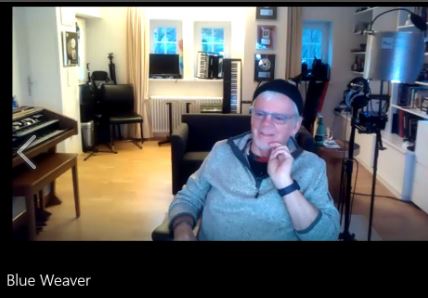
 RSS Feed
RSS Feed


